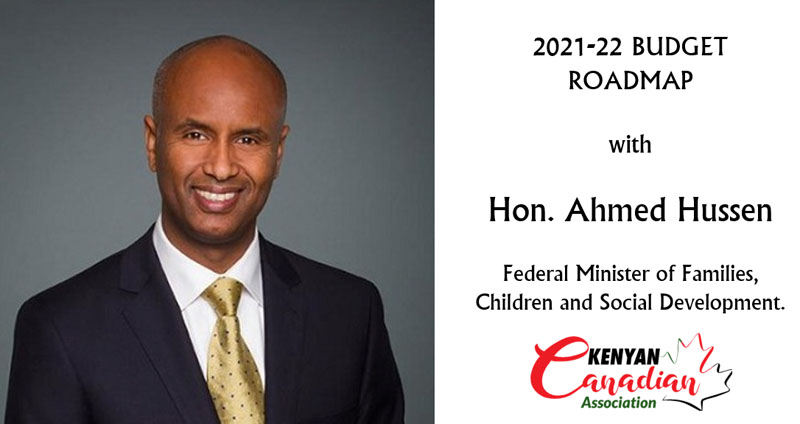
Federal Minister Ahmed Hussen Engages Kenyan Community Leaders in 2021 Budget Roadmap
Following a successful consultative meeting with Kenyan community leaders in Canada. Hon. Ahmed Hussen, Minister of Families, Children and Social Development, returned for a second community engagement forum with leaders from over 75 organizations and groups across Canada to discuss the roadmap for 2021 budget. The Federal budget was released on April 19, 2021 and it has been referred as the first-ever budget to allocate significant investment for the Black community, not-for-profit and charitable sector.
The Minister was joined by Brampton North Member of Parliament Hon. Ruby Sahota who the minister noted is a strong supporter and advocate for inclusion at the House of Commons in Ottawa. Hon Sahota has previously attended several virtual events hosted by the Kenyan Canadian Association during the COVID-19 pandemic to support the Black community in building resilience and planning for business recovery. She was a panelist for the building COVID-19 Resilience Business Empowerment Webinar that brought together small business owners in a bid to support them with resources to access government grants and services for their business.
Hon. Sahota encouraged the audience to create relationships with their local MPs in order to get helpful information on how to access funds through the various programs in the budget that will be rolled out in the coming months. Participants were urged to find their local MP contact information at https://www.ourcommons.ca/members/ based on their postal code. She further reminded parents to leverage the nation-wide Canada childcare program that will improve access to quality early childhood education by lowering the childcare support fees. The government aims to bring childcare down to $10 per day on average within the next five years and has allocated $27.2 billion over five years, with an annual injection of up to $9.2 billion permanently.
With the number of COVID-19 cases going up especially in Ontario, she urged the community leaders to encourage their constituents to get vaccinated and to follow Public Health Canada directives to support the efforts of bringing down the number of infections.
The Minister in his speech outlined a number of new programs in the budget such as the $200 million allocated to Employment and Social Development Canada (ESDC), a federal department, to establish a Black-led Philanthropic Endowment Fund to combat anti-Black racism and improve social and economic outcomes in Black communities as well as a pledge of $172 million over five years to Statistics Canada to implement an action plan to improve the collection of disaggregated, race-based data to fill knowledge gaps about racialized Canadians. According to the budget, the Government of Canada intends to do more to support racialized communities, improve understanding of racial inequities and barriers, build a more diverse and inclusive federal public service and work with partners to build a more equal and just future.
He also outlined other existing programs that received additional funding in the budget such as $100M to continue the Supporting Black Canadian Initiative, additional $51.7M for the Black Entrepreneurship program, additional funding for the affordable housing program that was previously $25M over five years and is now $100M in one year, extension of the Canada Emergency Wage Subsidy, Canada Emergency Rent Subsidy (CERS) and Lockdown Support; $87M to RCMP to fight anti-Black racism; Canada Student Grants will be doubled for eligible students, including up to $6,000 for full-time students and up to $3,600 for part-time students per academic year; investments in youth with over $5.7 billion over the next five years to help young Canadians—including from low-income households—pursue and complete their education, to provide additional relief from student loan debt for young graduates, and to create 215,000 new job skills development and work opportunities; increased old-age security for seniors; and additional funding for the Social Finance Fund. While this is only a handful of the programs, in the budget. You can download the budget and read more about investments in these programs at www.kcacanada.org/canada-federal-budget-2021.pdf
The Minister said that the budget was developed with two objectives: to support Canadians to deal with the on-going impact of COVID-19 and to lay the foundation of a strong green and inclusive recovery post-COVID-19. Noting that Canada may be steadily moving towards recovery as more vaccines get into the arms of Canadians. He noted that up to 400,000 Canadians have already been vaccinated and that by June, over 50 million vaccines will be delivered by the government.
Although there is significant investment exclusively for the Black community, the Minister stressed that there is even more investment in the budget that the Black community can leverage including the affordable housing, black entrepreneurship program, and social finance fund. The $87M to set up a program for public service procurement program to get access to government contract is a key program that is open to all Canadians and has actually been created in response to the Black community’s request to get access to government contracts.
Responding to a question from KCA’s Director of Newcomers & Settlement, Catherine Matimu, on access to proper housing for women facing homelessness during the pandemic, the Minister noted that since the pandemic onset, women shelters and agencies have received direct grants to provide more shelter space including conversion of hotels to shelters. In fall 2020, these agencies received $299M, and in the new budget have been allocated with $567M for 2022/2024 in addition to the base amounts they receive to provide more housing. Additionally, the reaching home program: Canada’s homelessness strategy that provides support for individuals to transition from shelters to home ownership, has received in the budget nearly $3 Billion. Also, the Canada housing benefits program will receive $1.46 Billion to help people at risk of homelessness.
During COVID-19, home ownership has been much more difficult with cost increasing significantly in major towns in Canada such as Toronto, Vancouver, Quebec, and Halifax. KCA’s Director of Social Economic Empowerment, Fatma Nadhir, sought to know how the budget would make it easier for first-time home buyers to own homes. The Minister remarked that recent changes to the first-time home buyers program have reflected this with individuals being allowed to borrow up to 4.5 times their qualifying income which itself has been increased to $150,000 from $120,000 annual income per household. You can read more about the program on the Canadian Mortgage and Housing Corporation (CMHC) https://www.cmhc-schl.gc.ca/.../first-time-home-buyer...
Asked by Nadhir on how the Black community can collaborate with his ministry, the Minister said that he is ready to collaborate with the community to build towards affordable housing for diverse groups within the Black community. Nadhir noted that within the Black community, Black Canadians from Continental Africa have a lot of catch up to do because they have not lived in Canada for as long as other black communities that have a long history of living in Canada and are much more established. The Minister said that he is working towards a solution that can allow banks to use innovative eligibility criteria for lending to close the lending gap between the Black community and other non-racialized communities. For instance, the history of consistently paying rent should count while evaluating the credibility of an individual to borrow among other criteria. He also noted that within the budget and his ministry he would allocate funds to experiment with pilot programs for affordable housing.
Even with the Black community, women entrepreneurs have been disproportionately impacted by the pandemic. Sanjit Kaur, KCA Director of Women and Gender Affairs, asked the Minister what support women from Continental Africa can look out for in the budget to help them to build capacity to grow their businesses. Hon Sahota noted that there are many opportunities for Black, Indigenous and People of Color (BIPOC) women in recognition of the challenges women face in accessing funding. The Minister added that the $221 m Black Entrepreneurship program introduced last years for Canadians of African descent received in this budget $51m and capacity building is part of it. Applications for this program will open in May, 2021. You can read about the program at www.ic.gc.ca/eic/site/150.nsf/eng/home
The minister also mentioned that the budget has allocated funds for communities and individuals to create and test products and services. Within this program, successful products or services that could benefit the government may be purchased by the government as a customer. To learn more about how to receive funds to create and test your product or service, please visit www.innovation.ca/
Mental health is currently poses monumental challenge to Canadians. In response to the audiences’ question on what support they can expect from the government through the budget, the Minister noted that up to $45M has been provided to Public Health agency and Health Canada to develop national mental health standards and $100M over 3 years to fund community-based and informed innovative mental health programs and $150M for support for youth mental health. More information on how to access these funds to develop innovative mental health programs for the community can be access at www.canada.ca/en/public-health.html and http://www.canada.ca/.../emergency-community-support-fund...
As the first session of the Community Engagement Forum was coming to an end, Kenyan High Commission to Canada’s Deputy Head of Mission Amb. Stephen Lorete thanked the Minister Hussen for reaching out to the Kenyan Community and highlighted the importance of working together while fostering closer bilateral relationship between Kenya and Canada.
In his vote of thanks to the forum participants, Swaleh Abdalla, the KCA Consular, Stakeholders and Corporate Affairs Committee Chair, encouraged the Kenyan Canadian community to work together and support each other.
Swaleh Abdalla together with other KCA leaders planned and facilitated the highly successful engagement forum. The team included KCA President Ephraim Mwaura, Board Chair Raphael Fernandes and Communication Director Farhan Kever. The KCA Communications & IT Committee team was represented by Minnie Karanja and Shihabuddin Hyder.

